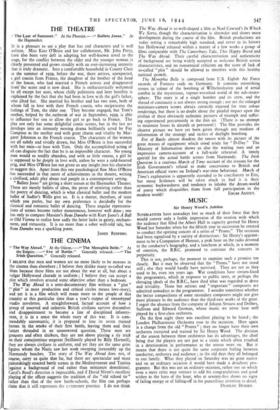THE THEATRE
IT is a pleasure to see a play that has real characters and is well written. Miss Kate O'Brien and her collaborator, Mr. John Perry, have also been very deft in adapting her well-known novel to the stage, for the conflict between the older and the younger woman is clearly presented and grows steadily with an ever-increasing intensity that is truly dramatic. Into a comfortable household in County Clare in the summer of 5939, before the war, there arrives, unexpected, a girl cousin from France, the daughter of the brother of the head of the house, who had married a French actress and disappeared from the scene and is now dead. She is enthusiastically welcomed by all except her aunt, whose chilly politeness and later hostility is explained by the fact that she had been in love with the girl's father, who jilted her. She married his brother and has two sons, both of whom fall in love with their French cousin, who reciprocates the feelings of Tom, the elder one. They become engaged, but Tom's mother, helped by the, outbreak of war in September, 1939, is able to influence her son to allow the girl to go back to France. The play not only has some delightful comic scenes, but in the last act develops into an intensely moving drama brilliantly acted by Fay Compton as the mother and with great charm and vitality by Mar- garet Johnston as the French cousin. The characters of the women are all subtly and vividly drawn, but Miss O'Brien is less successful with her men—at least with Tom. Only the accomplished acting of all can disguise the fact that he is an impossible character. No young man would so readily abandon, and with so little reason, a girl he is supposed to be deeply in love with, unless he were a cold-hearted prig, and Miss O'Brien has not given us any insight into his character to suggest this. Apart from this one psychological flaw Miss O'Brien has succeeded in that rarest of achievements in the theatre, writing a civilised, adult play about real people in a contemporary setting. " Ballets Jooss" are giving a short season at the Haymarket Theatre. These are mostly ballets of ideas, the prose of mimeing rather than the poetry of dancing, which is what classical ballet and the modern ballet of Sadler's Wells give us. It is a matter, therefore, of taste which you prefer, but my own preference is decidedly for the classical and romantic ballet of dancing. These angular representa- tions of scenes become rather monotonous, however well done ; one has only to compare Massine's Beau Danube with Kurt Jooss's A Ball in Old Vienna to realise how sadly the latter lacks in gaiety, enchant- ment, and virtuosity. It is no more than a sober well-told tale, but Beau Danube was a sparkling poem.
JAMES REDFERN.


























 Previous page
Previous page